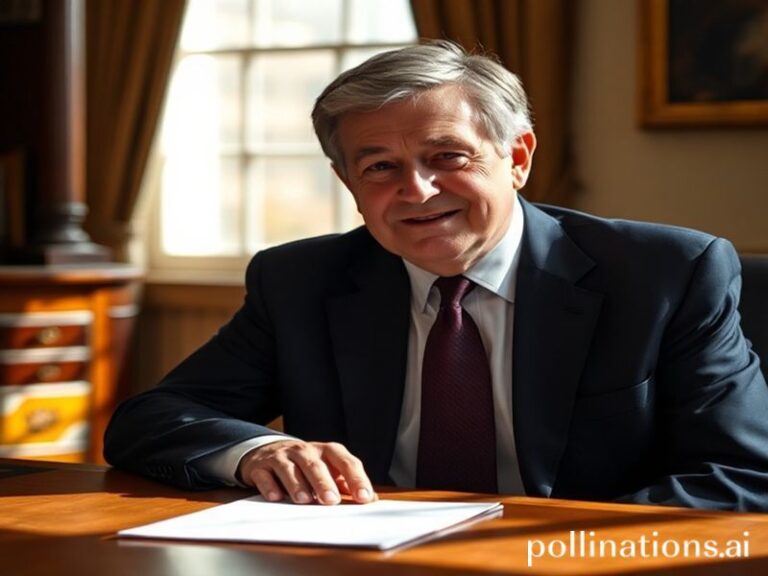Britain’s Triple-Lock Pension Hike: When Tea-Sipping Retirees Rock the Global Economy
The United Kingdom has once again reminded the planet that, even in an age of collapsing ice shelves and collapsing attention spans, the most combustible topic remains the annual cost of tea and biscuits for the over-66s. This week’s confirmation that the state pension will rise by 8.5 % next April—thanks to the infamous “triple lock”—sent shudders from Reykjavík to Riyadh, not because anyone abroad actually gets a cheque signed by HM Treasury, but because the ripple effects are as global as a Netflix outage.
For the uninitiated, the triple lock is Westminster’s answer to a drunk mechanical bull: whichever of earnings growth, inflation, or 2.5 % is highest, pensioners ride it all the way to the bank. This year earnings growth took the prize at 8.5 %, a figure that looks suspiciously like a clerical error until you remember the British labour market is currently held together by zero-hour contracts and the sheer willpower of Polish bartenders. The upshot: the full new state pension will hit £221.20 a week—enough, if you’re frugal, for a modest terraced house in 1973 or one artisanal sourdough in 2023.
Cue global eye-rolling. In Berlin, where the retirement age is edging toward “posthumous,” policymakers mutter darkly about moral hazard. In Tokyo—home to the world’s most geriatric electorate—officials gaze at their own deflationary pay packets and wonder whether importing the triple lock might finally tip the yen into origami. Meanwhile, in Washington, senators who can’t even lock a budget for more than three weeks at a time watch the spectacle with the quiet fascination of people observing someone else’s yacht catch fire. “If we tried that,” one staffer told me over a lukewarm Diet Coke, “the CBO score would come back stamped ‘LOL’.”
The macro implications are delightfully perverse. An extra £900 per pensioner per year sounds trivial—until you multiply it by 12 million retirees and recall that British pensioners have a documented fondness for Mediterranean cruises and Iberian property booms. Spain’s Costa del Sol is already bracing for an influx of gin-and-tonic-fuelled demand that will make local millennials wonder whether the real colonisers were the friends we made along the way. Likewise, pharmaceutical giants from Basel to Boston are quietly revising sales forecasts for statins and whatever new shade of blue pill is trending in the over-70 demographic.
Yet the policy also exports political risk. Emerging markets—whose young populations are already subsidising the West’s grey ones via remittances and underpaid care work—see the triple lock as a masterclass in gerontocracy. “It’s like a reverse child benefit,” quips a Nairobi economist, “except the children are in the Global South and the benefit is paid in stronger sterling.” Expect this talking point at the next COP summit, right after the bit where small island states ask why they’re drowning so that Dorset can afford heated towel rails.
Of course, defenders insist the uplift merely restores dignity after a decade of austerity that somehow spared the Ministry of Defence’s gold-plated paperclips. Critics counter that dignity is a flexible concept when the national debt is compounding faster than a TikTok rumour. Both miss the real dark comedy: locking pensions to wages in a country where wages themselves may soon be indexed to ChatGPT productivity metrics. Imagine a future algorithm deciding that, because AI has doubled output, granny’s stipend must rise 200 %. By the time anyone notices the error, the Treasury will be printing banknotes with King Charles wearing laser eyes.
In the end, the triple lock is less an economic lever than a global mood ring—turning whichever colour flatters the median voter at the precise moment ballots are counted. The rest of us, from Seoul stockbrokers to Lagos Uber drivers, get to watch the spectacle unfold in real time, like tourists rubbernecking at a traffic accident involving a red double-decker bus and the laws of arithmetic. Buckle up: the pension bus is accelerating, the cliff is approaching, and the only thing locked in tighter than the promise is the denial.







